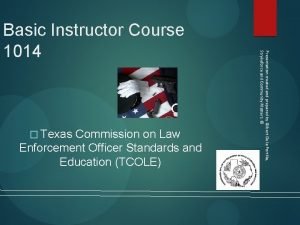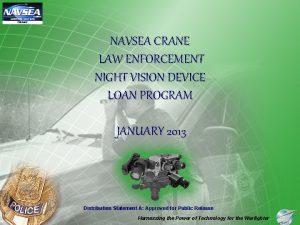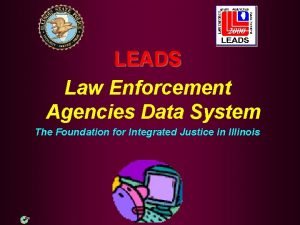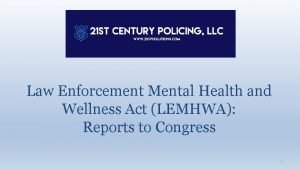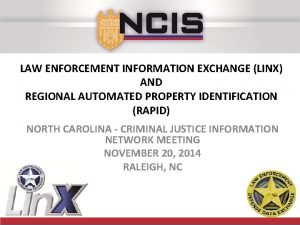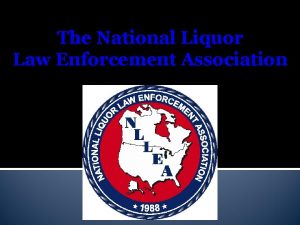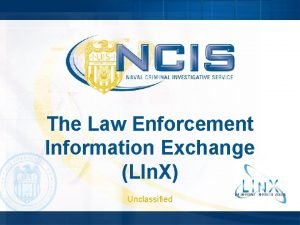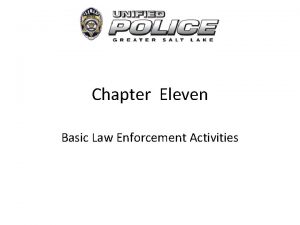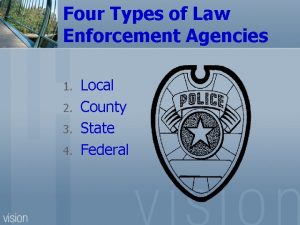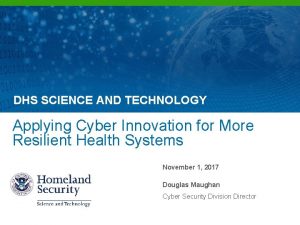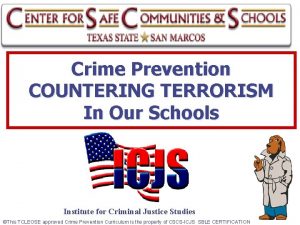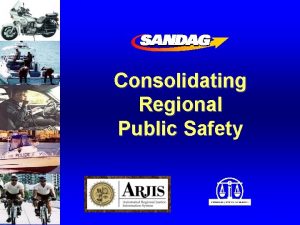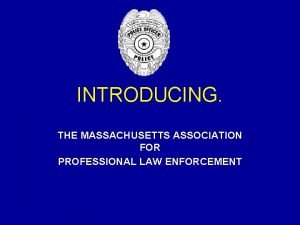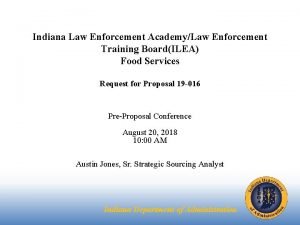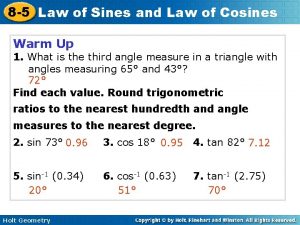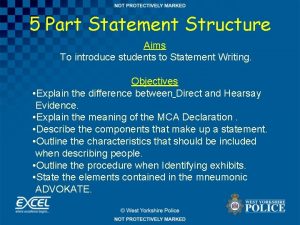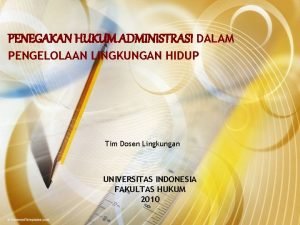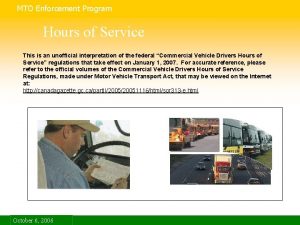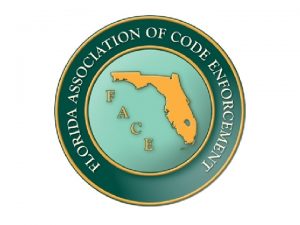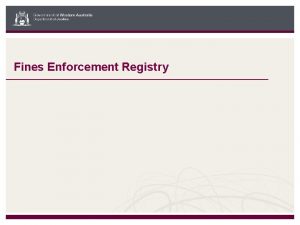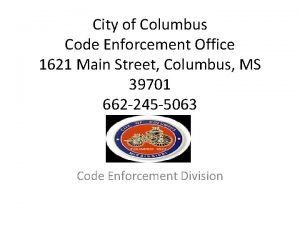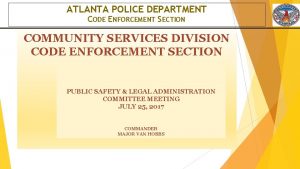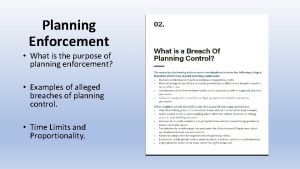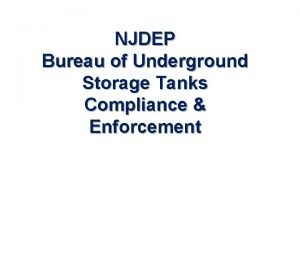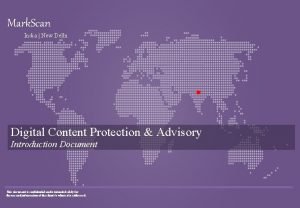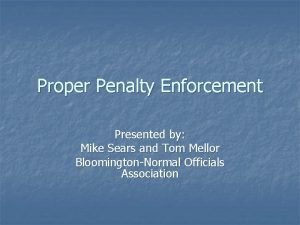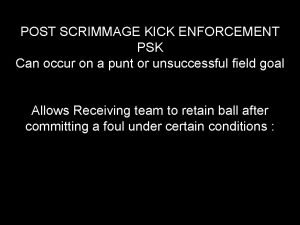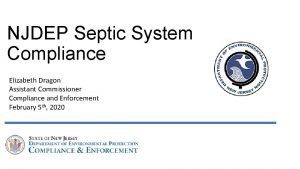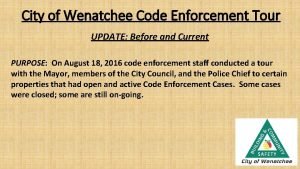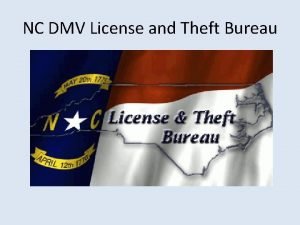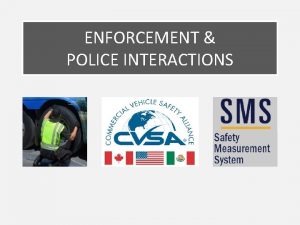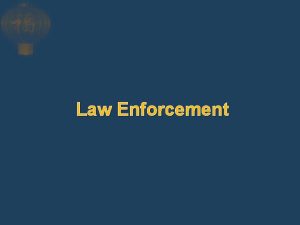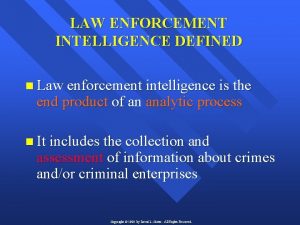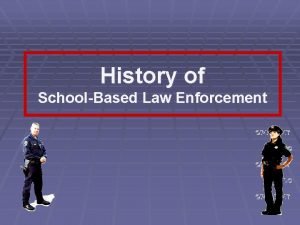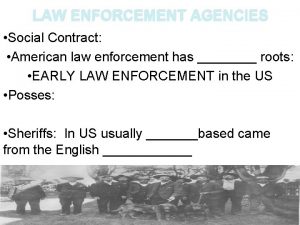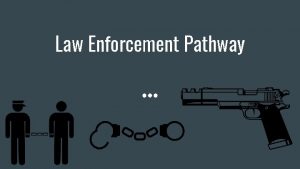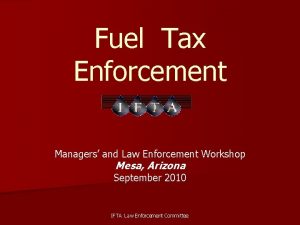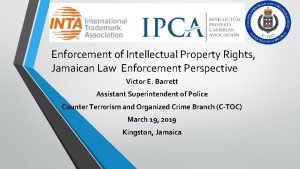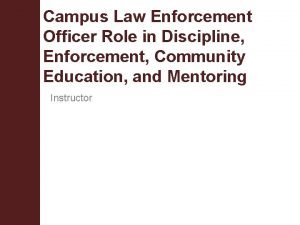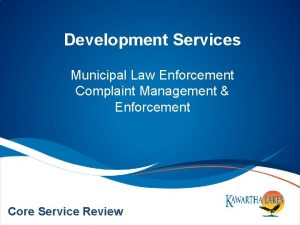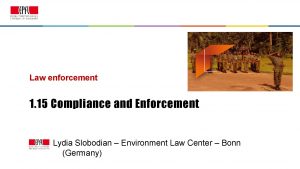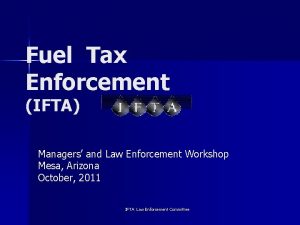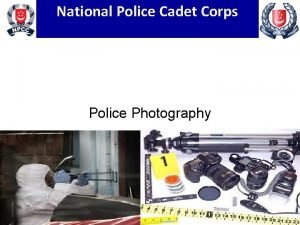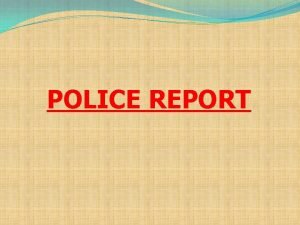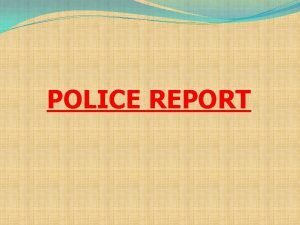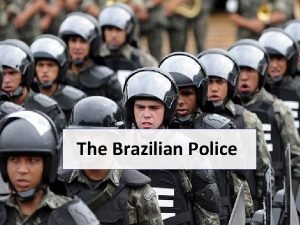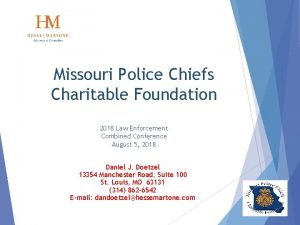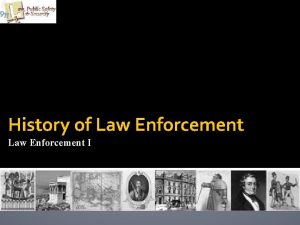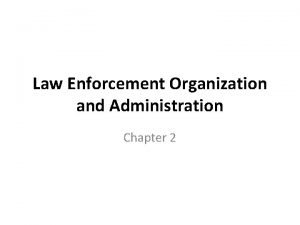Law Enforcement Police Police as a part of








































- Slides: 40

Law Enforcement: Police

Police as a part of the political system Police are a part of the political system, in which they help consolidate the political legitimacy and resources of the (local or national) government.

Police aims “The primary object of an efficient police is the prevention of crime: the next that of detection and punishment of offenders, if crime is commited. To these ends all the efforts of the police must be directed. The protection of the life and property, the preservation of public tranquility, and the absence of crime will alone prove whether those efforts have been successful and whether the objects for which the police were appointed have been obtained. ” Leonard H. Leigh

Investigating offences The police are entrusted with the power to investigate offences. In investigating offences the police have to act in accordance with Articles 5, 6 and 7 of the European Convention of Human Rights (ECHR).

Law and order The police is the institution in charge of protecting public order and repressing crime, and it is entitled to use physical force in order to meet these functions.

Historical development Until the early 1800 s most crime was combated by local constables with the help of the occasional citizen patrol As cities became more crowded, individual companies organized police forces to protect their interests Autonomous, professional, permanent – and in most cases local – police forces arose in the wake of urban growth and urban disorders, industrial disputes and riots, and widespread crime.

The Thames River Police The first police in London: The Thames River Police was created by West India Trading Company in 1798 80 full-time men Patrolled the London port The private police force so effective that Parliament authorized money to add men to their patrol

Robert Peel Sir Robert Peel (1788 -1850), a Conservative Prime Minister of the United Kingdom from 1834 -35 and again from 1841 -46 Created the first professional police force in 1829 Peel sponsored the Metropolitan Police Act which was passed by Parliament

Metropolitan Police Act of 1829 For the first time in Britain’s history, the Act established an organized police force in London, with 17 divisions of 4 inspectors each, its central base at Scotland Yard, under the purview of the Home Secretary.

“Bobbies” The men on patrol became known as “peelers” or “bobbies” after R. Peel https: //www. youtube. com/watch? v=y. RMX 0 Iq 5 s. E&list=PL 40 SV 6 x 3 NNb. PJ 9 ecp. Lp 2 fi. Oi. Un. CQzjp. AJ& index=4

Bobbies The first thousand of Peel’s police began to patrol the streets of London on September 29, 1829 Requirements: 6 ft tall and no history of wrong-doings

Blue tail-coats and top hats to look more like ordinary citizens

Peel’s vision The police force should operate from a centrally located headquarters accessible to the public Recruitment, selection and training Proper uniforms Weekly wage Familiar figures to the public Friendly image

London City Police, 1959

Legitimacy Police force is expected to be legitimate (i. e. reasonable, proportionate, and based on consent). Police legitimacy relies on consent from the public and the ruling regime.

Features The police institution has two distinctive features. First, it is wholly instrumental: it is meant to perform a definite task, linked to crime and disorder, under civil supervision. Second, it is defined by its capacity to use physical force.

Main police powers Arrest Search Entry Seizure Detention

Arrest The police can arrest persons suspected of having committed an offence with or without a warrant issued by a court For serious offences (“arrestable offences”) a suspect can be arrested without a warrant General arrest power (to prevent injury or damage)

Search The official examining of a person or a place A police officer has the power to stop and search people and vehicles if there are reasonable grounds for suspecting that stolen goods or weapons will be found The officer must state and record the grounds for taking this action Regulated by the Criminal Justice and Public Order Act of 1994 An unlawful search constitutes assault

Entry The right of the police to enter private property to find the wrongdoer The police can enter premises to make an arrest and search them to find their suspect Unlawful entry constitutes the tort of trespass

Seizure The instance of taking possession of somebody’s property by the authority When a lawful arrest is made, the police can seize articles and documents that could be used in evidence against the suspect The police can take any weapon or article that the suspect could use to harm himself or others

Detention An arrested person must be taken to a police station The suspect has a right to speak to an independent solicitor free of charge A suspect may refuse to answer police questions (”the right to silence”) according to the Criminal Justice and Public Order Act of 1994 For lesser offences, a suspect can be held in police custody for 24 hours For serious offences up to 96 hours without charge

Trends Since the 1990's, there has been a trend toward a kind of network policing in which diverse private and public institutions or agencies are brought together to combat and prevent crime and urban disorder.

Reforms The introduction of regulations and guidelines issued from the new public management perspective into police organizations during the 1990's A major focus has been control over police officers, the stress on individual accountability, and the diffusion of „better with less“ management policies.

Fight against terrorism The rising importance of law-and-order policies in the political agenda of many Western countries. Proving one's ability to deal with crime and lead the police forces tends to be a major asset in the political game. The fight against terrorism and international crime is vital to this trend.

Revision What is the police in charge of? Which are main police powers? When did professional police forces arise? Who created the first professional police force in Great Britain?

Match the verbs in the left column with the nouns in the right column: impose crime investigate offences safeguard rules protect tasks analyze physical force use public order conduct rights combat data

Translate the collocations: Impose rules Investigate offences Safeguard rights Protect public order Analyze data Use physical force Conduct tasks Combat crime

Rewrite the following sentences replacing the underlined expressions with expressions from the text. The law has to strike a balance between preserving and protecting the rights of individuals and giving the police the necessary powers to conduct their tasks effectively. Any restrictions on an individual’s liberty must be framed with sufficient precision to allow citizens to predict the consequences of their actions and avoid the use of discretionary power. The police is the institution in charge of protecting public order and fighting crime, and it is allowed to use physical force in order to meet these functions. Police legitimacy relies on approval from the public and the ruling regime. Since the 1990's, there has been a trend toward a kind of network policing in which diverse private and public institutions or agencies are brought together to fight and avoid crime and urban disorder.

Complete the following sentences: The police institution is meant to perform a definite task, linked to _______, under civil supervision. The police institution is defined by its capacity to use ________. As opposed to the military use of force, police force is expected to be _________. Since the 1990's, there has been a trend toward a kind of ________ in which diverse private and public institutions or agencies are brought together to combat and prevent crime and urban disorder.

The police institution is meant to perform a definite task, linked to CRIME AND DISORDER, under civil supervision. The police institution is defined by its capacity to use PHYSICAL FORCE. As opposed to the military use of force, police force is expected to be LEGITIMATE. Since the 1990's, there has been a trend toward a kind of NETWORK POLICING in which diverse private and public institutions or agencies are brought together to combat and prevent crime and urban disorder.

Translate the following paragraph from the text: In investigating offences the police have to act in accordance with Articles 5, 6 and 7 of the European Convention of Human Rights (ECHR). Any restrictions on an individual’s liberty must be framed with sufficient precision to allow citizens to foresee the consequences of their actions and avoid the use of arbitrary power. The police is the institution in charge of protecting public order and repressing crime, and it is entitled to use physical force in order to meet these functions. The police powers include the power of arrest, entry, stop, search and seizure.

Complete the definitions: _______ is the right of the police to enter private property in order to find the wrongdoer. _______ is the act of taking hold of a wrongdoer by the authority of the law. ____ is the instance of taking possession of somebody’s property by the authority. ____ is the official examining of a person or a place for stolen property or other important details.

Answer key ENTRY is the right of the police to enter private property in order to find the wrongdoer. ARREST is the act of taking hold of a wrongdoer by the authority of the law. SEIZURE is the instance of taking possession of somebody’s property by the authority. SEARCH is the official examining of a person or a place for stolen property or other important details.

Conditional clauses If the custody officer decides that there is insufficient evidence ______ (charge) the suspect, the suspect must be released. If the custody officer has reasonable grounds for ______ (believe) that detention without charge is necessary ______ (secure) or _______ (preserve) evidence relating to an offence for which the suspect is under arrest, or to obtain such evidence by _______ (question) the suspect, he or she may order further police detention. The grounds for the detention _______ (must, record) in writing on the custody record.

Answer key If the custody officer decides that there is insufficient evidence to charge the suspect, the suspect must be released. If the custody officer has reasonable grounds for believing that detention without charge is necessary to secure or preserve evidence relating to an offence for which the suspect is under arrest, or to obtain such evidence by questioning the suspect, he or she may order further police detention. The grounds for the detention must be recorded in writing on the custody record.

ECHR, Article 6 Right to a fair trial Read par. 1 and explain when the public may be excluded from trials: (1) In the determination of his civil rights and obligations or of any criminal charge against him, everyone is entitled to a fair and public hearing within a reasonable time by an independent and impartial tribunal established by law. Judgment shall be pronounced publicly but the press and public may be excluded from all or part of the trial in the interests of morals, public order or national security in a democratic society, where the interests of juveniles or the protection of the private life of the parties so require, or to the extent strictly necessary in the opinion of the court in special circumstances where publicity would prejudice the interests of justice. Discuss the meaning of the following sentence: (2) Everyone charged with a criminal offence shall be presumed innocent until proved guilty according to law.

Translate par. 3 into Croatian: (3) Everyone charged with a criminal offence has the following minimum rights: (a) to be informed promptly, in a language which he understands and in detail, of the nature and cause of the accusation against him. (b) to have adequate time and facilities for the preparation of his defence. (c) to defend himself in person or through legal assistance of his own choosing or, if he has not sufficient means to pay for legal assistance, to be given it free when the interests of justice so require. (d) to examine or have examined witnesses against him and to obtain the attendance and examination of witnesses on his behalf under the same conditions as witnesses against him. (e) to have the free assistance of an interpreter if he cannot understand or speak the language used in court.

3. Svatko optužen za kazneno djelo ima najmanje sljedeća prava: a) da u najkraćem roku bude obaviješten, potanko i na jeziku koji razumije, o prirodi i razlozima optužbe koja se podiže protiv njega; b) da ima odgovarajuće vrijeme i mogućnost za pripremu svoje obrane; c) da se brani sam ili uz branitelja po vlastitom izboru, a ako nema dovoljno sredstava platiti branitelja, ima pravo na besplatnog branitelja, kad to nalažu interesi pravde; d) da ispituje ili dade ispitati svjedoke optužbe i da se osigura prisutnost i ispitivanje svjedoka obrane pod istim uvjetima kao i svjedoka optužbe; e) besplatnu pomoć tumača ako ne razumije ili ne govori jezik koji se upotrebljava na sudu.

Thank you for your attention!
 Texas commission on law enforcement
Texas commission on law enforcement Law enforcement night vision
Law enforcement night vision Leads database law enforcement
Leads database law enforcement Lemhwa report to congress
Lemhwa report to congress Law enforcement information exchange
Law enforcement information exchange Law enforcement and emergency services video association
Law enforcement and emergency services video association Virginia law enforcement assistance program
Virginia law enforcement assistance program National liquor law enforcement association
National liquor law enforcement association Law enforcement information exchange
Law enforcement information exchange Elvis law enforcement database
Elvis law enforcement database Military and law enforcement
Military and law enforcement Military and law enforcement
Military and law enforcement Law enforcement agencies
Law enforcement agencies Law enforcement first responder
Law enforcement first responder Law enforcement agency
Law enforcement agency Calphoto dmv
Calphoto dmv Massachusetts association for professional law enforcement
Massachusetts association for professional law enforcement Ilea dishes
Ilea dishes Gst law enforcement
Gst law enforcement Lesson 8-5 law of sines and cosines
Lesson 8-5 law of sines and cosines Newton's first law and second law and third law
Newton's first law and second law and third law Newton's first law of motion
Newton's first law of motion V=k/p
V=k/p Charles law constant
Charles law constant 5 part witness statement
5 part witness statement Second line enforcement
Second line enforcement Mto hours
Mto hours Florida association of code enforcement
Florida association of code enforcement Fines enforcement registry
Fines enforcement registry Code enforcement columbus ohio
Code enforcement columbus ohio Atlanta code enforcement
Atlanta code enforcement Planning enforcement
Planning enforcement Njdep ust registration form
Njdep ust registration form Markscan enforcement
Markscan enforcement Hpd enforcement desk bed bugs
Hpd enforcement desk bed bugs Nfhs holding penalty enforcement
Nfhs holding penalty enforcement Post scrimmage kick enforcement
Post scrimmage kick enforcement What is dragon assistant 3
What is dragon assistant 3 City of wenatchee code enforcement
City of wenatchee code enforcement Asean wildlife enforcement network
Asean wildlife enforcement network Nc license and theft bureau phone number
Nc license and theft bureau phone number
